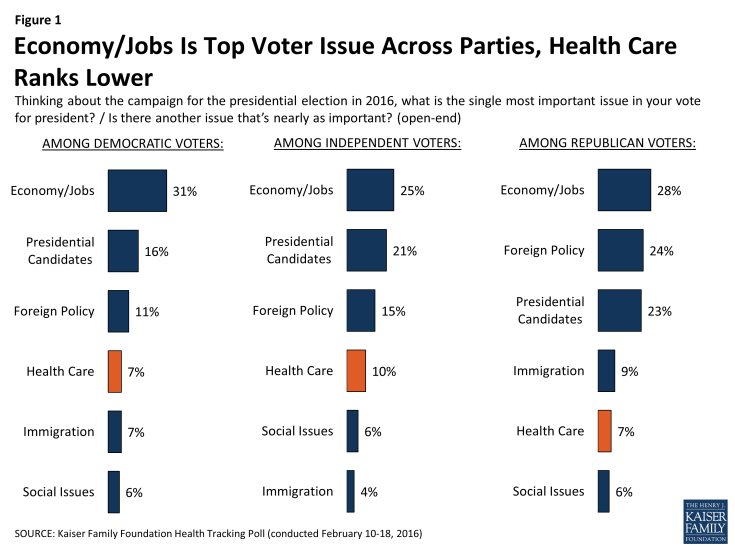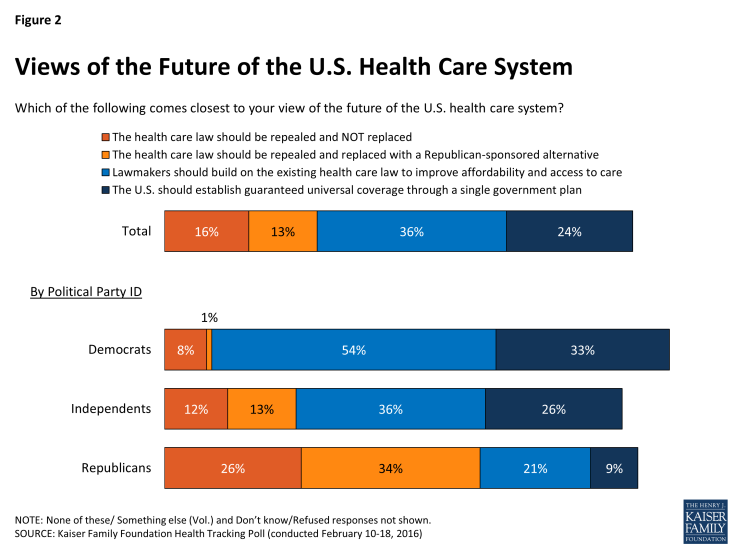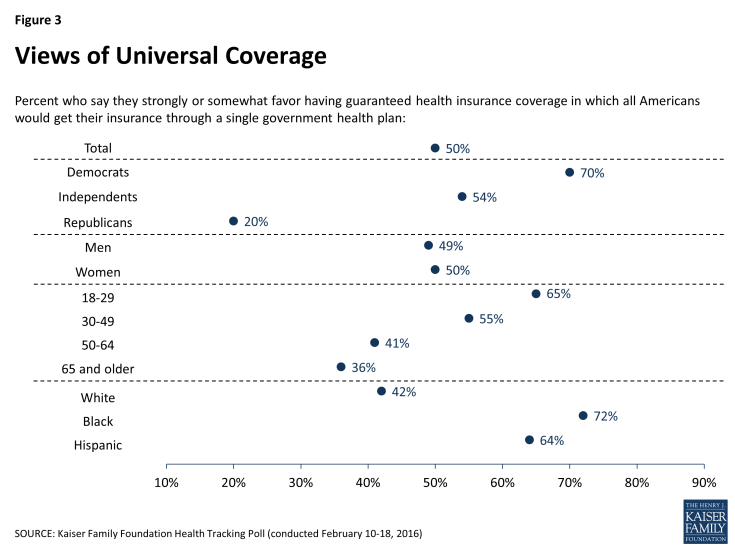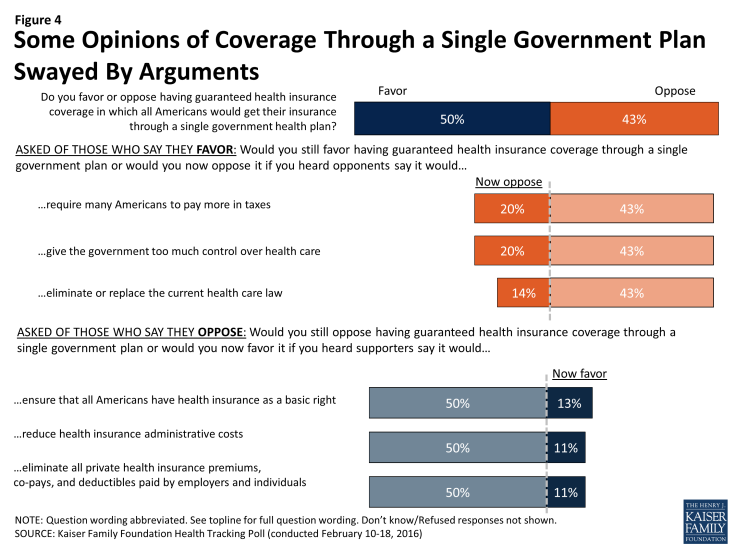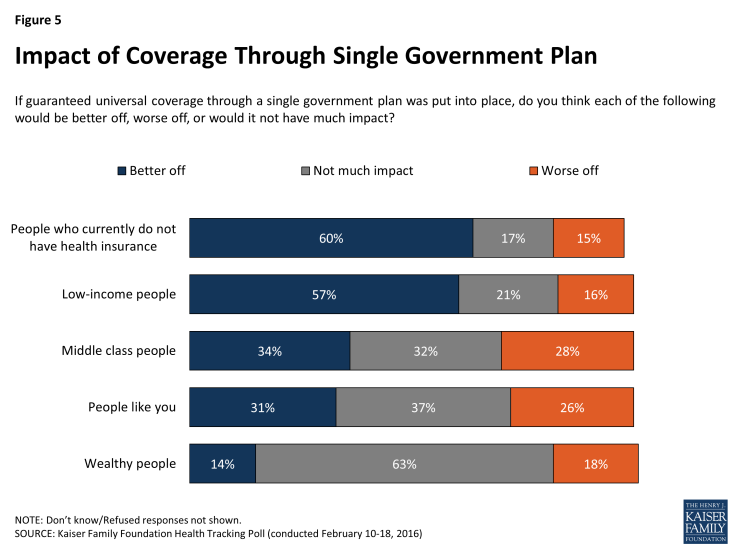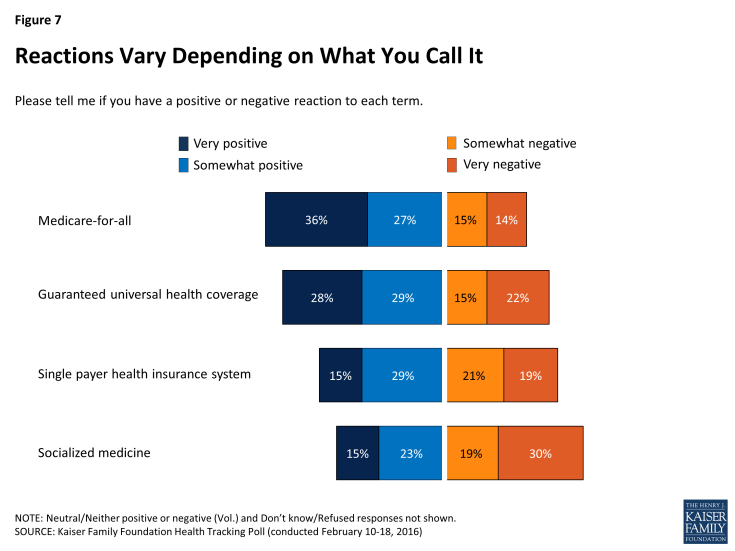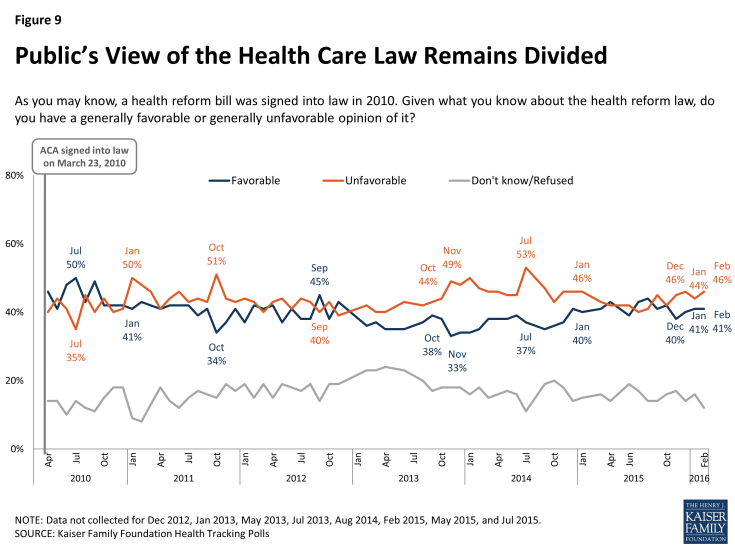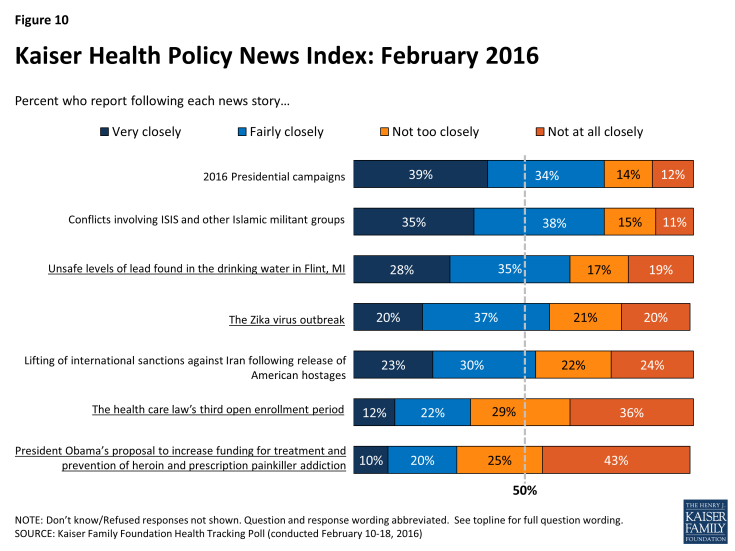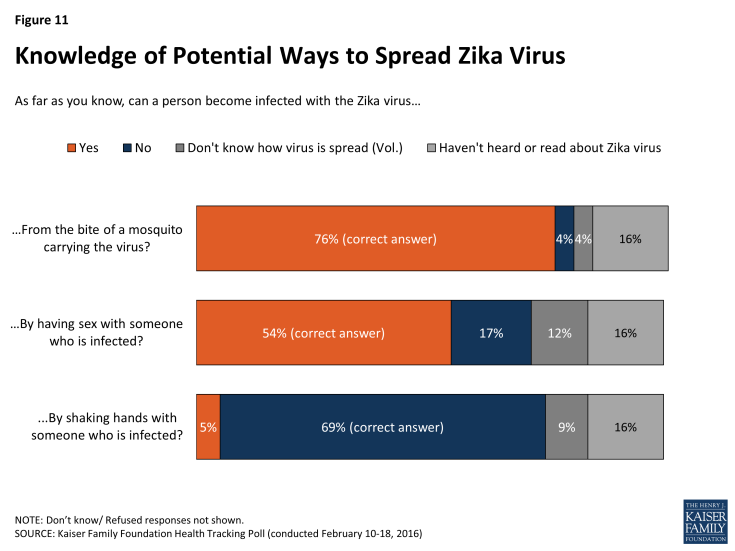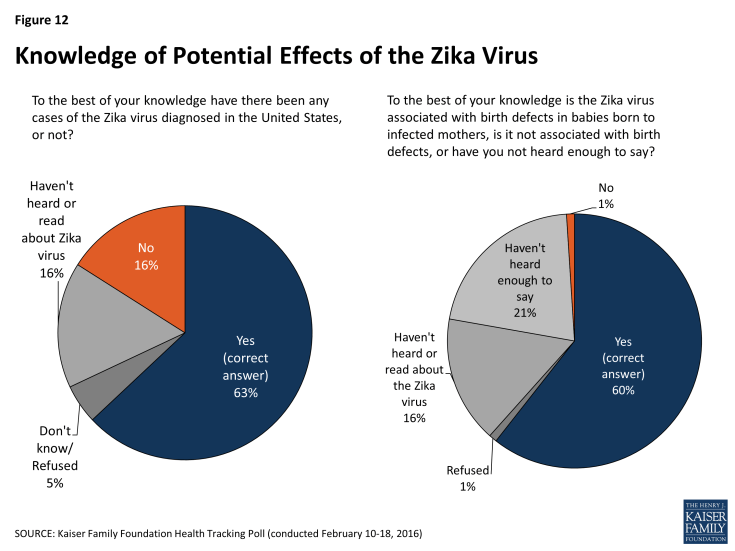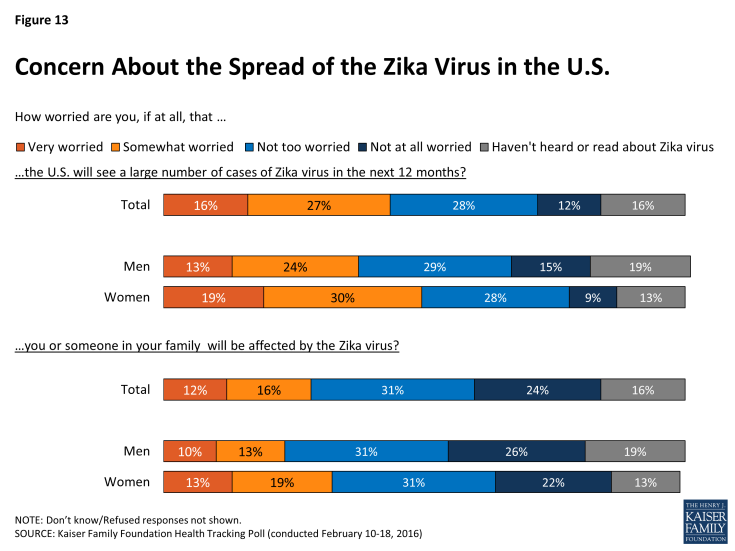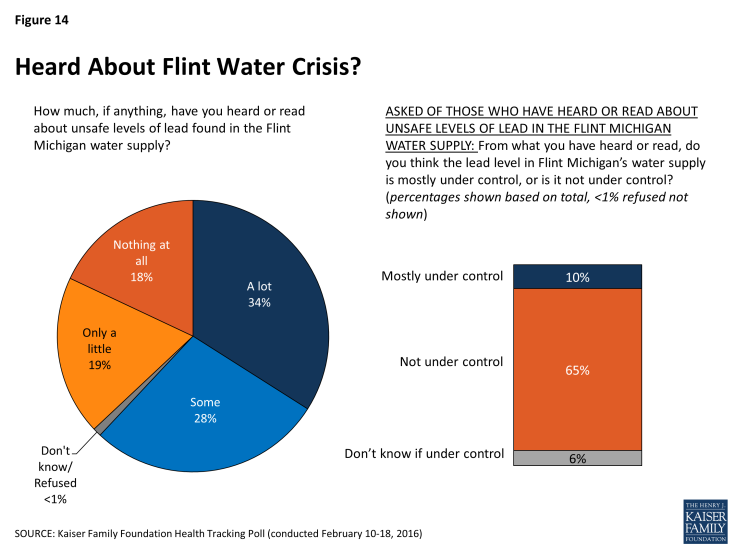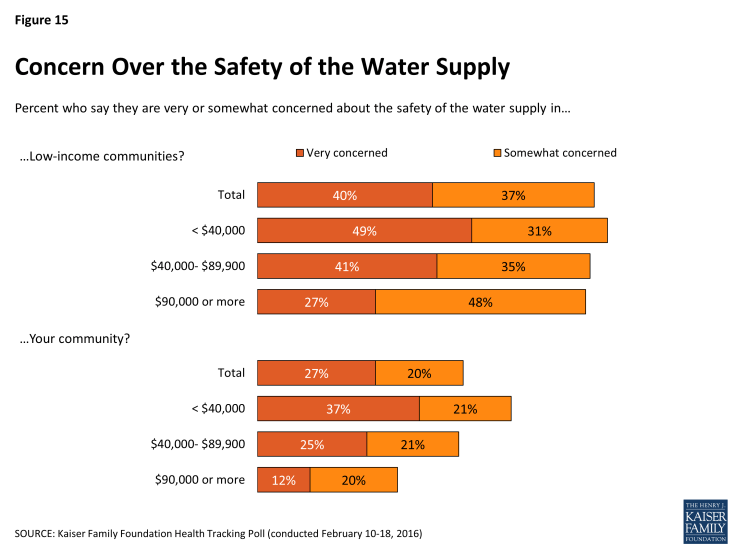Kaiser Health Tracking Poll: February 2016
The February Kaiser Health Tracking Poll asked the public about broad options for changing the health system that are currently being discussed and finds more Americans (36 percent) say policymakers should build on the existing law to improve affordability and access to care than any other option presented. Sixteen percent say they would like to see the health care law repealed and not replaced, 13 percent say it should be repealed and replaced with a Republican-sponsored alternative, and 24 percent say the U.S. should establish guaranteed universal coverage through a single government plan.
As debate continues over the idea of universal coverage through a single government plan, the survey finds the public divided, with half saying they favor the idea and 43 percent saying they oppose it, and some opinions swayed after hearing counterarguments. In addition, majorities of Democrats and independents favor the idea, compared to just 20 percent of Republicans. Most Americans think that if guaranteed universal coverage through a single government plan was put into place, uninsured and low-income people would be better off, but there is little consensus among the public about how it would impact their care personally.
This month’s poll also explores the public’s reaction to a few terms used to describe the idea of expanding health insurance coverage to all Americans. Majorities say they have a positive reaction to the terms “Medicare-for-all” and “guaranteed universal health coverage” and fewer say the same for “single payer health insurance system” and “socialized medicine.” About half (53 percent) of Democrats say they have a very positive reaction to “Medicare-for-all” compared with 21 percent who say the same for “single payer health insurance system.”
Following the water crisis in Flint Michigan, about half (47 percent) of the public is concerned about the water supply in their community, and this share jumps to nearly eight in 10 when the public is asked about their concern over the water supply in low-income communities.
A majority of the public are aware of how the Zika virus is or is not transmitted, its presence in the U.S. and its suspected association with birth defects.
The Role of Health in the 2016 Presidential Election
With the 2016 primary election campaign in full swing, three-fourths of Americans (73 percent) report they are following news about it closely with the economy/jobs currently being the most important issue to voters in the upcoming presidential election (27 percent). Health care ranks fourth at 8 percent, behind presidential candidates’ characteristics or positions on the issues (21 percent), and foreign policy (16 percent). Similar shares of Democratic voters (7 percent), independent voters (10 percent), and Republican voters (7 percent) say health care is a top voting issue.
Next Steps for the Health Care System
While health care ranks fourth as an important voting issue, presidential hopefuls have proposed a range of visions for the future of the health care system, from the full repeal of the Affordable Care Act (ACA) to the adoption of a universal government plan. The survey finds that when given four broad approaches for the future of the health care system that are currently being discussed, Americans opinions are split with the largest share reporting that they favor building on the ACA and the existing system. Overall, 36 percent say lawmakers should build on the existing law to improve affordability and access to care, 24 percent say the U.S. should establish guaranteed universal coverage through a single government plan, 16 percent say they would like to see the health care law repealed and not replaced, and 13 percent say it should be repealed and replaced with Republican-sponsored alternative.
A closer look at views across parties shows that a third of Democrats (33 percent) favor the idea of universal coverage through a single government plan but more Democrats (54 percent) say they would prefer to build on the existing health care law. A roughly similar share of independents (26 percent) say the U.S. should establish guaranteed universal coverage through a single government plan, and 36 percent say lawmakers should build on the existing health care law. The majority of Republicans (60 percent) say they would like to repeal the health care law whether it’s replaced or not, although 21 percent say they would like to build on the existing law and 9 percent say they would like universal coverage through a government plan.
Views of Guaranteed Universal Coverage from a Government Plan
Half (50 percent) of Americans say they favor the idea of having guaranteed health insurance coverage in which all Americans would get their insurance through a single government plan while 43 percent say they oppose it. Majorities of Democrats (70 percent), independents (54 percent), adults under age 30 (65 percent), and members of racial minority groups (72 percent of Black Americans, 64 percent of Hispanic Americans) report a favorable opinion. Republicans are the least likely group to express a favorable view (20 percent).
How Malleable are Americans’ Opinions of Guaranteed Health Coverage From a Government Plan?
Although half of the public says they favor having guaranteed health insurance coverage through a single government health plan, some can be swayed by counterarguments made by critics. For instance, 20 percent overall shift their opinion from favor to oppose after hearing that guaranteed coverage through a single government plan would “require many Americans to pay more in taxes,” 20 percent say they now oppose the idea after hearing that it would “give the government too much control over health care,” and 14 percent say they now oppose it after hearing that it would “eliminate or replace the current health care law.” On the other side of the debate, those who originally said they opposed the idea were also persuaded by arguments, although fewer changed their opinions after hearing the arguments. About one in 10 changed their stance from oppose to favor after hearing that guaranteed coverage would “ensure that all Americans have health insurance as a basic right” (13 percent), that it would “reduce health insurance administrative costs” (11 percent), and that it would “eliminate all private health insurance premiums, co-pays, and deductibles paid by employers and individuals” (11 percent).
Impact of Coverage Through Single Government Plan
Most Americans think that if guaranteed universal coverage through a single government plan was put into place, uninsured and low-income people would be better off (60 percent and 57 percent, respectively). Fewer say that middle class people (34 percent) and people like them (31 percent) would be better off, which is roughly similar to the shares who say these same groups will be worse of or not be impacted much at all. Most (63 percent) say it would not have much impact on wealthy people, just 14 percent say they would be better off and 18 percent say they would be worse off. Democrats and independents are more likely than Republicans to report that all people would be better off through a single government plan.
The country has not had a substantial public debate about single payer legislation recently and there is little consensus among the public about how enacting guaranteed universal coverage through a single government plan would impact their personal health care. Roughly four in 10 say that they think the cost, quality, availability of health care treatments, and choice of doctors and hospitals would stay about the same as it is under the current health care system. About a third say these measures would get worse if universal coverage was put into place and around two in 10 think these measures would get better. Not surprising considering their stances on the idea of guaranteed universal coverage, majorities of Republicans say each measure would likely get worse if such a plan was enacted, while at least half of Democrats say each would likely stay about the same. Additionally, those under age 50, Black and Hispanic Americans, and those with lower incomes are more likely than their counterparts to say that these measures will get better.
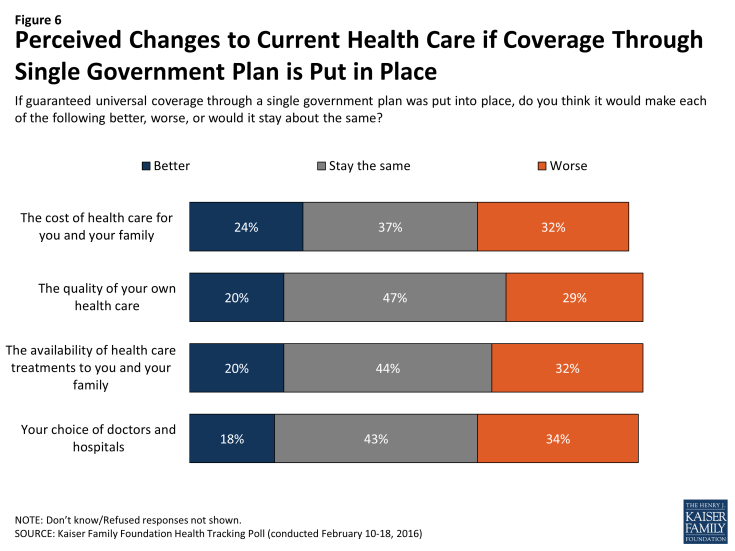
Figure 6: Perceived Changes to Current Health Care if Coverage Through Single Government Plan is Put in Place
Wording Matters
Politicians and pundits use a variety of terms to describe the idea of expanding health insurance coverage to all Americans and this month’s poll explores the public’s reaction to a few of these terms. Nearly two-thirds (64 percent) of Americans say they have a positive reaction to the term “Medicare-for-all” and more than half (57 percent) say they have a positive reaction to the term “guaranteed universal health coverage.” Less than half of Americans report a positive association with the phrases “single payer health insurance system” (44 percent) and “socialized medicine” (38 percent).
Similar to the public at large, more Democrats report having a positive reaction to “Medicare-for-all” and “guaranteed universal health coverage” than say the same about “socialized medicine” or “single payer health insurance system.” Additionally, more Democrats have positive reactions to all of the terms than Republicans and independents do. Around half of Democrats report a very positive reaction to “Medicare-for-all” (53 percent) and “guaranteed universal health coverage” (44 percent), while fewer Republicans say the same for each (17 percent and 9 percent, respectively). Two in 10 Democrats report very positive reactions to “socialized medicine” (22 percent) and “single payer health insurance system” (21 percent), while fewer than one in 10 Republicans do.
| Table 1 | |||
|
Please tell me if you have a positive or negative
reaction to each term.
|
Democrats | Independents | Republicans |
| Medicare-for-all | |||
| Very Positive | 53% | 32% | 17% |
| Somewhat Positive | 28 | 35 | 20 |
| Somewhat Negative | 11 | 12 | 26 |
| Very Negative | 4 | 15 | 28 |
| Guaranteed universal health coverage | |||
| Very Positive | 44 | 26 | 9 |
| Somewhat Positive | 32 | 33 | 17 |
| Somewhat Negative | 13 | 13 | 23 |
| Very Negative | 5 | 22 | 47 |
| Socialized medicine | |||
| Very Positive | 22 | 15 | 4 |
| Somewhat Positive | 33 | 25 | 12 |
| Somewhat Negative | 18 | 21 | 20 |
| Very Negative | 15 | 26 | 59 |
| Single payer health insurance system | |||
| Very Positive | 21 | 17 | 6 |
| Somewhat Positive | 37 | 29 | 18 |
| Somewhat Negative | 22 | 19 | 25 |
| Very Negative | 6 | 18 | 34 |
| NOTE: Neutral/ Neither positive or negative (Vol.) and Don’t Know/ Refused responses not shown. | |||
Americans’ Opinions of the Affordable Care Act
Should the Debate Continue?
In the midst of the presidential campaigns and political battles over the future of the country’s health care system, half (49 percent) of Americans say they are tired of hearing about the debate over the ACA and think the country should focus more on other issues, while another 46 percent say they think it is important for the country to continue the debate. Not surprisingly, opinions on the matter differ across partisans. A majority of Republicans (58 percent) prefer to see the debate continue, while a similar share of Democrats (59 percent) say they are tired of the debate. Independents are split down the middle with 47 percent saying they are tired of the debate and 46 percent saying they want it to continue.
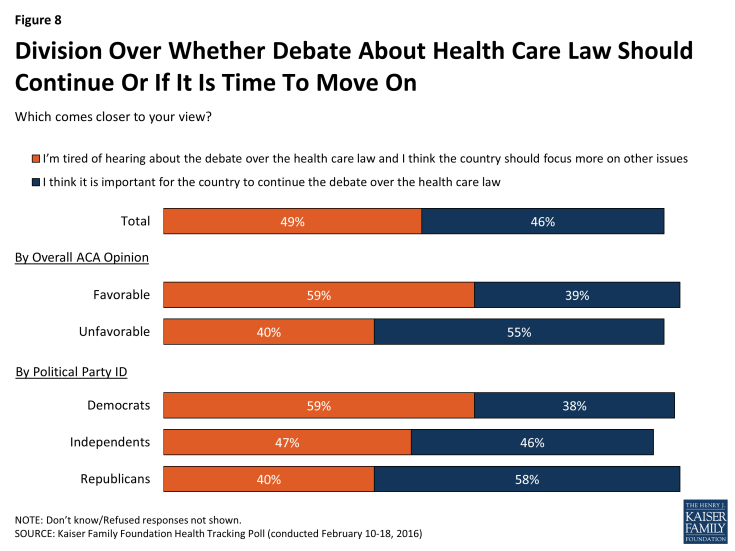
Figure 8: Division Over Whether Debate About Health Care Law Should Continue Or If It Is Time To Move On
So far in 2016, opinion of the health care law itself remains largely stable, with 41 percent saying they have a favorable view and 46 percent saying they have an unfavorable view. Furthermore, partisans continue to hold widely differing views; two-thirds of Democrats (66 percent) report a favorable view, while nearly eight in 10 Republicans (78 percent) report an unfavorable view, and independents fall in the middle, tilting negative, with 38 percent saying they have a favorable opinion and 49 percent saying they have an unfavorable opinion.
Kaiser Health Policy News Index: February 2016
The February Kaiser Health Tracking poll finds that, like last month, the most closely followed stories are the 2016 presidential campaign and news about conflicts involving ISIS and other Islamic militant groups (73 percent say they are following each ‘very’ or ‘fairly’ closely). The most closely followed health policy news story is the unsafe lead levels in Flint Michigan’s water, with 64 percent of Americans reporting they followed the story either ‘very closely’ (28 percent) or ‘fairly closely’ (35 percent). This is followed by the Zika virus outbreak with 57 percent reporting that they followed this story ‘very closely’ (20 percent) or ‘fairly closely’ (37 percent) which is roughly similar to the share of individuals who reported following the lifting of international sanctions against Iran following the release of American hostages (53 percent). Fewer Americans report closely following news on the health care open enrollment period (34 percent) or President Obama’s proposal to increase government funding for treatment and prevention of opioid addiction (30 percent).
The Zika Virus Outbreak
Over the past month both the Obama Administration and the World Health Organization announced increased spending to combat the Zika virus outbreak. The mosquito-borne virus, which has mostly affected South and Central American countries and has been associated with birth defects in babies born to infected mothers, was declared a global health emergency by the United Nations on February 1st.1 About six in 10 Americans (57 percent) report that they closely followed news about the Zika virus outbreak with a similar share reporting that they have heard or read at least some about the virus (61 percent).2
The majority of the public is aware of the potential ways to spread the virus and potential effects of the virus. Three-quarters (76 percent) report that they are aware that a person can become infected through a bite from an infected mosquito, more than half (54 percent) are aware that a person can become infected by having sex with someone who is infected, and seven in 10 (69 percent) are aware that it does not appear to be spread through shaking hands with an infected person.
In addition, more than six in 10 (63 percent) of the public are aware that there are cases of infected persons in the U.S. And while the link between the Zika virus and birth defects in children born to infected mothers has not been proven, 60 percent of Americans report knowing about this potential connection.
About four in 10 (43 percent) of the public are worried that the U.S. will see a large number of cases of the Zika virus in the next 12 months and three in 10 (28 percent) are worried that they or someone in their family will be affected by the Zika virus. Likely due to the virus’ potential connection to birth defects, women are somewhat more likely than men to be worried about a potential outbreak in the U.S. (49 percent vs. 37 percent) or if they or someone in their family may be affected by the virus (32 percent vs. 23 percent).
Unsafe Levels of Lead in Flint Michigan’s Water Supply
Nearly two-thirds (64 percent) of Americans report following news about unsafe levels of lead in Flint Michigan’s water supply closely, and a similar share (63 percent) say that they have heard or read a lot (34 percent) or some (28 percent) about it. Another 37 percent report hearing or reading only a little (19 percent) or nothing at all (18 percent) about the crisis. More than six in 10 people (65 percent) say that the lead level of Flint Michigan’s water supply is not under control compared to one in 10 who say that it is mostly under control and 6 percent who do not know.
Nearly eight in 10 Americans (77 percent) report that they are concerned about the safety of the water supply in low income communities in the U.S. with 40 percent reporting that they are ‘very concerned,’ while less than half (47 percent) are concerned about the safety of the water supply in their own community, with 27 percent reporting that they are ‘very concerned.’ People with lower incomes are more likely to report being concerned about the safety of the water supply in their own communities.

